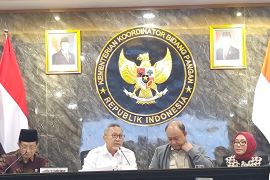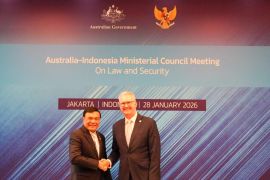Baby Boomers are portrayed as the most resilient while Strawberry Generation is viewed as a smarter and more efficient one, albeit less tough than the older counterpart.
All generations are national assets which can contribute to national advancement, if one would actually look at the plus sides of each generation.
The intergenerational conflicts have begun since before the national Independence era, with Rengasdengklok incident as one prime example.
It was the peak of clash between national figures, represented by Soekarno and Hatta, against the initiative of younger people, led by Sajuti Melik, Wikana, Subadio Sastrosatomo, and their fellows.
Generally, older people are wiser and more cautious when they come.to formulate plan and execute it, whereas their younger counterparts like to rush things and want things instantly. These kinds of tendencies are also seen among the older and younger generations of that era.
The young people wanted Soekarno and Hatta to immediately declare independence. This sparked heated debate between the two groups due to opposing outlooks and stances. The conflict ended up with Soekarno and Hatta getting kidnapped and then hidden somewhere in Rengasdengklok, an area which is now in Karawang, West Java.
The intergenerational conflicts seem to happen in every turn of era, often incited by different values, mindsets, and common goals. Each generation is born and raised at different times and environments, both of which affect the.nature of a generation's characteristics.
Boomers, Strawberry
Baby Boomers generation was born at times after the second world war; they were raised in the midst of harsh political situation of that era, which molded them into the resilient people that we know today.
Generation X, or also known as Gen Bust, came after Baby Boomers. Those belonging to this generation were characterized from their independence because their parents often left them for work.
The next generation is called millenials. They were born and raised when computers were introduced and developed, which led to their awareness of technology. Afterwards, there is Gen Z, who basks in the convenience offered by digital technology.
Millenials and Gen Z grow up in a relatively safe and secure times, so they do not experience the mental hardships that their older counterparts went through. Because they grow up at such environment, wherein things are easy and instant to get, some of them grow up less mentally tough.
In Rhenald Kasali's book, "Strawberry Generation", he stated that the newer generations have many bright ideas and endless creativity. However, they are easy to give up, and get hurt, slower, egoistic, and very pessimistic of the future.
Those belonging to the strawberry generation are known for their mental health issues, which stem from their tendency to be mushy. What's more, they often self-diagnose themselves with digital applications.
The strawberry generation is a Chinese term which was coined to refer to Taiwanese people who were born in the 90s. Like strawberry, they are easy to bruise, and thus deemed incompetent in facing social pressures and not used to hardships.
Mockery, back and forth
The intergenerational insults have been thrown since fourth century Before Christ. Aristotle once expressed his resentment towards Greek youth, whom he saw as overconfident people who loved to act as know-it-alls.
BBC quoted Aristotle's thought in article titled "People Have Always Winged about Young Adults, Here's Proof" issued on October 3, 2017.
"They act like they know everything, and always be overly confident about it. (The youth are) arrogant because they have yet to experience the hardships of life, or being in a situation beyond their control."
Recently, in social media, millenials and Gen Z's are at such dispute. Millenials are seen as out of date, whereas Gen Zs are seen as tacky because they often make big deal out of trivial things, like hairstyle, and fashion sense.
Prior to that intergenerational clash, the Baby Boomers Generation had already had their share of being laughed at with the sarcastic phrase "Ok, boomer". The phrase was made popular by a member of New Zealand parliament, then 25-year-old Chlöe Swarbrick, at a forum a few years ago. She made the comment in response to another politician who was insulting her during a speech on climate change.
The "Ok, boomer" phrase, which was recorded in a video, went viral and became a meme depicting the old generation's old-fashioned ways versus young generation's modern views.
An expert on psychology from California Polytechnic University, Shawn Meghan Burn, stated in an article titled "Do You Need to Mind the Generation Gap?" issued on January 21, 2020, that "Believing in our group's superiority and other groups' inferiority boosts self-esteem and solidarity within our own group."
"Unfortunately, the negative stereotypes of the other group that fuel our self-esteem and solidarity frequently create unnecessary distance and conflict between our group and the other group (intergroup conflict)."
Ending the conflict
Will the current generations of this country carry on with the conflict endlessly, or are they willing to end the tradition? There has been plentiful of examples of intergenerational conflicts, from every part on earth, in any point in history. Conflicts, whatever form they take, almost always benefit no one.
If one will look at the basic character of a generation, highlight the goods and improve the bad ones, there will be a positive power that comes from it. The power can be turned into productivity that will further national advancement.
A subconscious intergenerational conflict can happen in families, workplaces, and even at greater, national scale. At any rate, endless conflicts can not bode well if they are left unchecked, let alone blown out of proportion.
It is even worse when the conflict leads to no consensus which can be seen as positive and useful thing for future improvements.
Boomers may be seen as too strict and too stubborn, but behind it all, they mean well, as it is their way to exercise a more careful approach towards everything. Likewise, the Strawberry Generation, which is deemed too soft, can turn it into something that can soothe the Boomers.
Mutual understanding is a key to building a good relationship among different generations. Why must only the young ones give in? No matter how great the youth are, lack of manner or etiquette will make everything they have pointless.
Collective awareness is also a foundation that every generation must uphold as a method of building a better future, as it will move them to pass values of wisdom to the next generation coming after them.
With the collective awareness, every generation will realize that in every step, there will always be challenges and barriers.
Related news: S Kalimantan has high prospects of producing golden generation: BKKBN
Related news: Mothers' health key to realizing smart, stunting-free generation: BRIN
Editor: Rahmad Nasution
Copyright © ANTARA 2023












